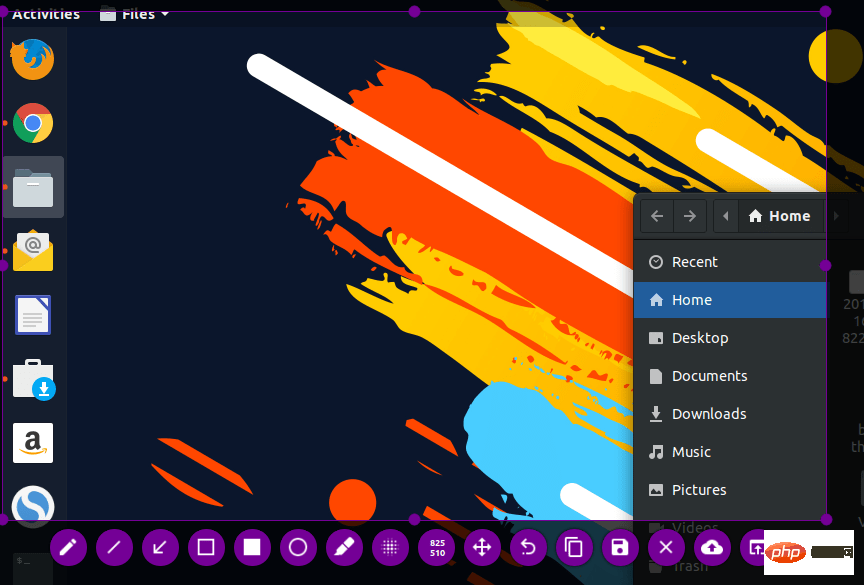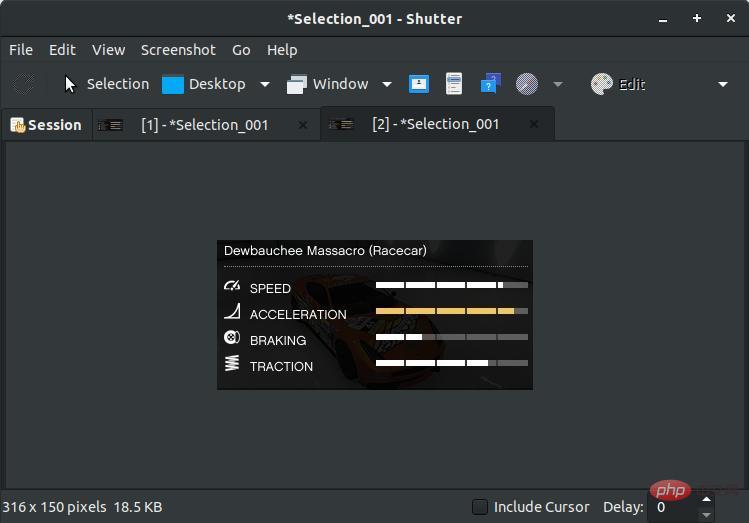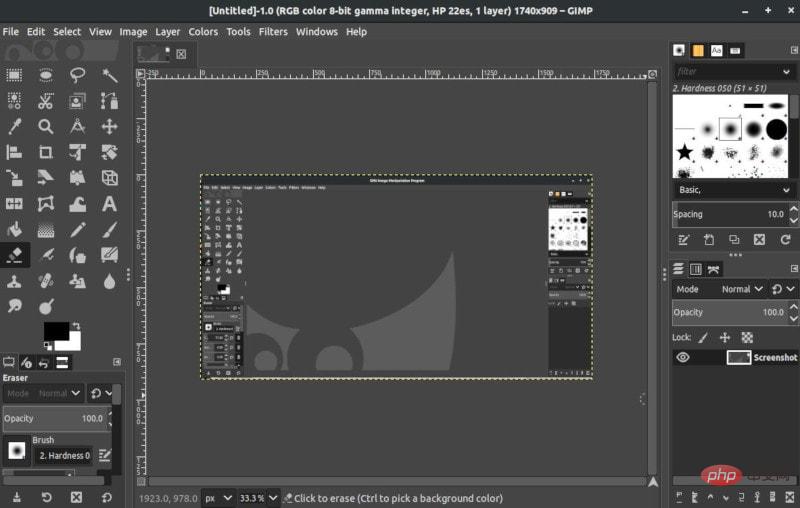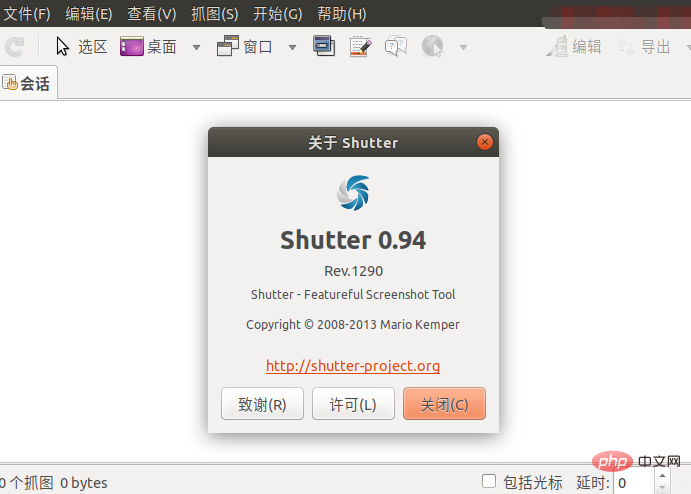 Operation and Maintenance
Operation and Maintenance
 Linux Operation and Maintenance
Linux Operation and Maintenance
 What are the screenshot software for Linux?
What are the screenshot software for Linux?
What are the screenshot software for Linux?
Linux screenshot software includes: 1. Flameshot, an open source screenshot tool that can annotate, blur and other operations on pictures; 2. Shutter, a screenshot tool applicable to all mainstream Linux distributions; 3. GIMP , is a screenshot software that can perform image zooming, adding filters, etc.; 4. Shutter, etc.

The operating environment of this tutorial: Ubuntu 16.04 system, Dell G3 computer.
linux screenshot software
1. Flameshot
Flameshot is an open source screenshot available for Linux Tools
Flameshot provides almost all the basic features you need from a screenshot tool in Linux.

Function overview:
Comment (highlight, mark, add text, frame selection)
Blurred picture
Picture cropping
Upload to Imgur
Use another Open a screenshot of an app
If you need a new screenshot tool that can be used to annotate, blur, and upload to imgur, then Flameshot is a good choice.
2. Shutter
Shutter is a screenshot tool applicable to all mainstream Linux distributions. Although it has not been updated recently, it is still an excellent tool for manipulating screenshots.

Function overview:
Comment (highlight, mark, add text, frame selection)
Blurred picture
Picture cropping
Upload to picture website
3, GIMP

Function overview:
Advanced image editing functions (zoom, add filters, color Correction, adding layers, cropping, etc.)
Take a screenshot of a certain area
If you need to do some pre-editing of the screenshot, GIMP is a good choice.
4. Shutter
shutter screenshot software supports full-screen screenshots, designated area screenshots, picture editing and other functions. If your system is Ubuntu16.04, it is recommended to use this tool. If you are using Ubuntu 18.04, this tool is not recommended because the libgoo-canvas-perl component has been removed from the Ubuntu default repository. Without this component, you will not be able to edit images and can only take screenshots.
Install shutter
oucanrong@zcwyou:~$ sudo apt install -y shutter
Shutter main interface

##5, flameshot
flameshot is perfect Supporting ubuntu18.04, flameshot also supports full-screen screenshots, designated area screenshots, image editing and other functions. Suitable for tutorials, similar to WeChat picture editing and QQ screenshots. Install flameshotoucanrong@zcwyou:~$ sudo apt install -y flameshot
6. DeepinScrot
DeepinScrot is a domestic screenshot tool. You can completely regard it as a Linux version of QQ screenshot. Download DeepinScrot deb packagewget http://packages.linuxdeepin.com/deepin/pool/main/d/deepin-scrot/deepin-scrot_2.0-0deepin_all.deb
sudo apt install -y python-xlib libcanberra-gtk-module
sudo dpkg -i deepin-scrot_2.0-0deepin_all.deb
sudo apt-cache search xxx Then install the relevant dependency packages sudo apt install -y xxx
Linux Video Tutorial 》
The above is the detailed content of What are the screenshot software for Linux?. For more information, please follow other related articles on the PHP Chinese website!

Hot AI Tools

Undresser.AI Undress
AI-powered app for creating realistic nude photos

AI Clothes Remover
Online AI tool for removing clothes from photos.

Undress AI Tool
Undress images for free

Clothoff.io
AI clothes remover

Video Face Swap
Swap faces in any video effortlessly with our completely free AI face swap tool!

Hot Article

Hot Tools

Notepad++7.3.1
Easy-to-use and free code editor

SublimeText3 Chinese version
Chinese version, very easy to use

Zend Studio 13.0.1
Powerful PHP integrated development environment

Dreamweaver CS6
Visual web development tools

SublimeText3 Mac version
God-level code editing software (SublimeText3)

Hot Topics
 1386
1386
 52
52
 How to use docker desktop
Apr 15, 2025 am 11:45 AM
How to use docker desktop
Apr 15, 2025 am 11:45 AM
How to use Docker Desktop? Docker Desktop is a tool for running Docker containers on local machines. The steps to use include: 1. Install Docker Desktop; 2. Start Docker Desktop; 3. Create Docker image (using Dockerfile); 4. Build Docker image (using docker build); 5. Run Docker container (using docker run).
 Difference between centos and ubuntu
Apr 14, 2025 pm 09:09 PM
Difference between centos and ubuntu
Apr 14, 2025 pm 09:09 PM
The key differences between CentOS and Ubuntu are: origin (CentOS originates from Red Hat, for enterprises; Ubuntu originates from Debian, for individuals), package management (CentOS uses yum, focusing on stability; Ubuntu uses apt, for high update frequency), support cycle (CentOS provides 10 years of support, Ubuntu provides 5 years of LTS support), community support (CentOS focuses on stability, Ubuntu provides a wide range of tutorials and documents), uses (CentOS is biased towards servers, Ubuntu is suitable for servers and desktops), other differences include installation simplicity (CentOS is thin)
 What to do if the docker image fails
Apr 15, 2025 am 11:21 AM
What to do if the docker image fails
Apr 15, 2025 am 11:21 AM
Troubleshooting steps for failed Docker image build: Check Dockerfile syntax and dependency version. Check if the build context contains the required source code and dependencies. View the build log for error details. Use the --target option to build a hierarchical phase to identify failure points. Make sure to use the latest version of Docker engine. Build the image with --t [image-name]:debug mode to debug the problem. Check disk space and make sure it is sufficient. Disable SELinux to prevent interference with the build process. Ask community platforms for help, provide Dockerfiles and build log descriptions for more specific suggestions.
 How to view the docker process
Apr 15, 2025 am 11:48 AM
How to view the docker process
Apr 15, 2025 am 11:48 AM
Docker process viewing method: 1. Docker CLI command: docker ps; 2. Systemd CLI command: systemctl status docker; 3. Docker Compose CLI command: docker-compose ps; 4. Process Explorer (Windows); 5. /proc directory (Linux).
 What computer configuration is required for vscode
Apr 15, 2025 pm 09:48 PM
What computer configuration is required for vscode
Apr 15, 2025 pm 09:48 PM
VS Code system requirements: Operating system: Windows 10 and above, macOS 10.12 and above, Linux distribution processor: minimum 1.6 GHz, recommended 2.0 GHz and above memory: minimum 512 MB, recommended 4 GB and above storage space: minimum 250 MB, recommended 1 GB and above other requirements: stable network connection, Xorg/Wayland (Linux)
 Detailed explanation of docker principle
Apr 14, 2025 pm 11:57 PM
Detailed explanation of docker principle
Apr 14, 2025 pm 11:57 PM
Docker uses Linux kernel features to provide an efficient and isolated application running environment. Its working principle is as follows: 1. The mirror is used as a read-only template, which contains everything you need to run the application; 2. The Union File System (UnionFS) stacks multiple file systems, only storing the differences, saving space and speeding up; 3. The daemon manages the mirrors and containers, and the client uses them for interaction; 4. Namespaces and cgroups implement container isolation and resource limitations; 5. Multiple network modes support container interconnection. Only by understanding these core concepts can you better utilize Docker.
 What is vscode What is vscode for?
Apr 15, 2025 pm 06:45 PM
What is vscode What is vscode for?
Apr 15, 2025 pm 06:45 PM
VS Code is the full name Visual Studio Code, which is a free and open source cross-platform code editor and development environment developed by Microsoft. It supports a wide range of programming languages and provides syntax highlighting, code automatic completion, code snippets and smart prompts to improve development efficiency. Through a rich extension ecosystem, users can add extensions to specific needs and languages, such as debuggers, code formatting tools, and Git integrations. VS Code also includes an intuitive debugger that helps quickly find and resolve bugs in your code.
 vscode cannot install extension
Apr 15, 2025 pm 07:18 PM
vscode cannot install extension
Apr 15, 2025 pm 07:18 PM
The reasons for the installation of VS Code extensions may be: network instability, insufficient permissions, system compatibility issues, VS Code version is too old, antivirus software or firewall interference. By checking network connections, permissions, log files, updating VS Code, disabling security software, and restarting VS Code or computers, you can gradually troubleshoot and resolve issues.



